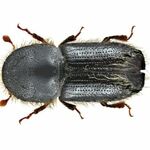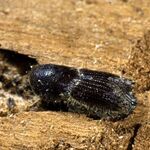
Forestry Journal – 22-01-2025
Ips cembrae made headlines recently, after a small number of bark beetles were intercepted in pheromone lure traps in the west of Scotland conifer bark beetle Pest Free Area (PFA).
So what threat do these insects pose? ( Dr Terry Mabbett)
IT'S bad enough to have one exotic bark beetle putting exports of timber to pest-free countries like Ireland in jeopardy, but following the European spruce bark beetle Ips typographus settling in for the duration across southern England, Ips cembrae (large larch beetles) were found at an Irish port on logs imported from Scotland. This led to an indefinite ban being placed on the movement of conifer wood from parts of Scotland's west coast. Unlike Great Britain, the island of Ireland (Republic of Ireland and Northern Ireland) is free of I. cembrae.

That said, a significant swathe of western Scotland from the Mull of Kintyre, Mull through to Fort William and over the sea to Skye is called the PFA, which stands for 'Pest Free Area' – but apparently no longer. Indeed, I. cembrae was first identified in the PFA back in 2022. What's more, in February 2024 similar 'preventative action' was taken after Scottish Forestry chiefs admitted they could no longer guarantee that Dendroctonus micans (the great spruce bark beetle) was not within the PFA. All this comes hard on the heels of I. typographus being found in Fife woodland in Scotland and then on Sitka spruce in the south of England. It all goes to show the wider international implications and consequences of exotic quarantine pests establishing on our trees and timber.
Ireland is understandably proud of its pest-free status for so many forestry pests that appear to be running and flying around here at will.
"Ireland is free of many of the bark beetles that are found in Europe and in Great Britain," boasted Senator Pippa Hackett, Ireland's agriculture minister. "It is very important for the future of the forestry sector in Ireland that we do everything we can to keep the island free of these beetles. My department has a clear plant health and biosecurity strategy and has built up a strong multi-disciplinary plant health team. These findings demonstrate the importance and effectiveness of our surveillance work at ports."




